Weirdest animal: Portuguese man-of-war , some facts and photos
This is the Portuguese man-of-war (Physalia physalis), one of the weirdest animals on the planet Earth
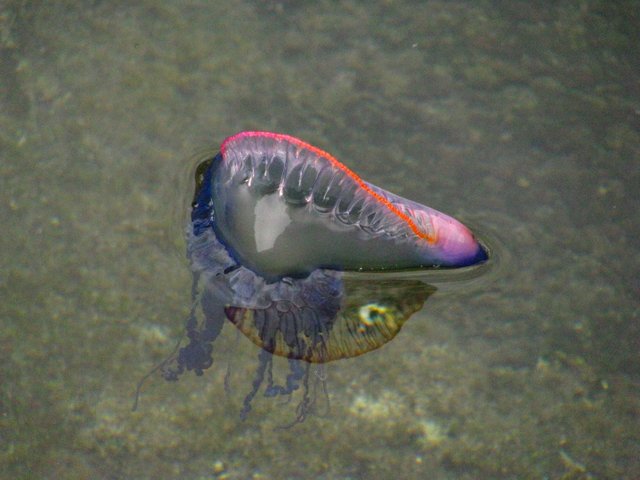
It looks like a jellyfish, it acts like a jellyfish... but it's not a jellyfish!!
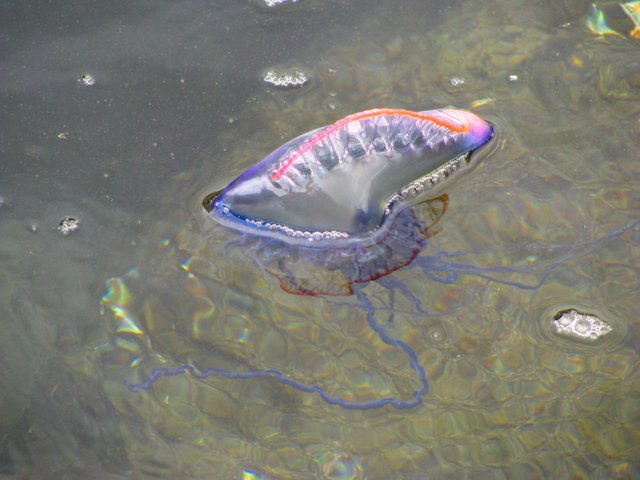
Do you think you are looking to one organism?
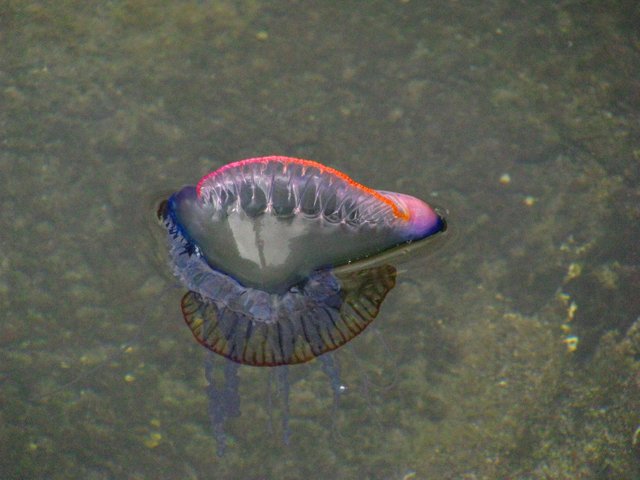
Wrong!!
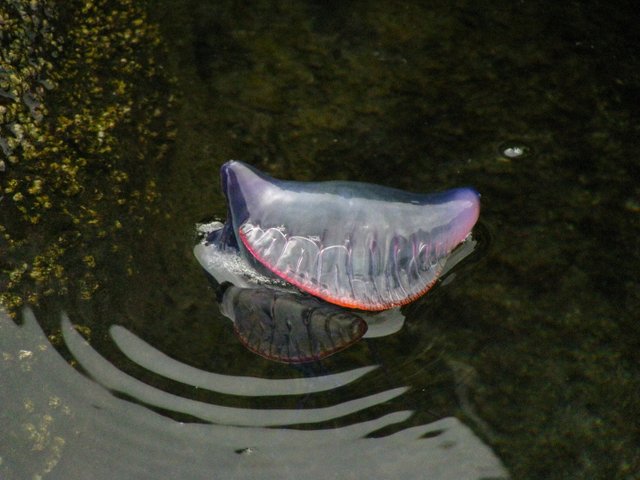
It is actually a colony of organisms working together
The Portuguese man-of-war is a siphonophore that comprises four separate polyps that are combined to breed, reproduce, feed and survive.
This are the four types of polyps:
- pneumatophore, or float;
- dactylozooids, or tentacles;
- gastrozooids, or feeding zooids; and
- gonozooids which produce gametes for reproduction.
In other languages it is known as the 'Portuguese war-ship' (Dutch: portugees oorlogsschip, Swedish: portugisisk örlogsman, Norwegian: portugisisk krigsskip, Finnish: portugalinsotalaiva), the 'Portuguese galley' (German: portugiesische Galeere, Hungarian: portugál gálya), the 'Portuguese caravel' (Portuguese: caravela-portuguesa, Spanish: carabela portuguesa, Italian: caravella portoghese), or the 'Portuguese little boat' (Russian: португальский кораблик).
The tentacles bear stinging, venom-filled nematocysts, and can extend 165 feet (50 meters) in length below the surface, although 30 feet (10 meters) is more the average. They are the main mechanism for catching prey, as they can paralyze and kill fish and other small creatures. They are also used for defense.
Muscles in the tentacles draw prey up to a polyp containing the gastrozooids or digestive organisms, which are located along the underside of the float. Each man-of-war has multiple gastrozooids complete with individual mouths.
For humans, a man-of-war sting is excruciatingly painful!! It can make a grown up cry, believe me!
It causes severe pain (resembling those caused by a whip), skin lacerations, fever, convulsions, respiratory distress and in some cases death. It leaves red welts on the skin that can be very painful for several days.
The tentacles should not be touched, EVER!!
Distribution
This species floats on or the near the surface of the ocean. Moved by a combination of winds, currents, and tide, it might be found in the Atlantic Ocean, the Pacific Ocean, the Indian Ocean, the Caribbean, and the Sargasso Sea (they are especially common in theses warm waters).
Sometimes, since the Portuguese man-of-war has no means of propulsion, they are found in groups of 1,000 or more, floating in warm waters throughout the world's oceans.
Here are some cool videos I found out
1 - A short detailed explanation
2 - Short explanation with pretty cool images (also creepy)
3 - Stunning video...
The first four photos were taken in the Azores Islands in one of my last trips! It's pretty fascinating, but...be careful, it can hurt you badly!
I am a Conservation Biologist studying invasive plants. Sometimes my curiosity makes me want to know a little more about other subjects, usually, nature related. I found those man-of-war photos recently in my hard-disk and asked myself why the light sting I had was so painful? Now I know what caused it and shared the information I gathered with you. As soon as possible I will return to my invasive species post.
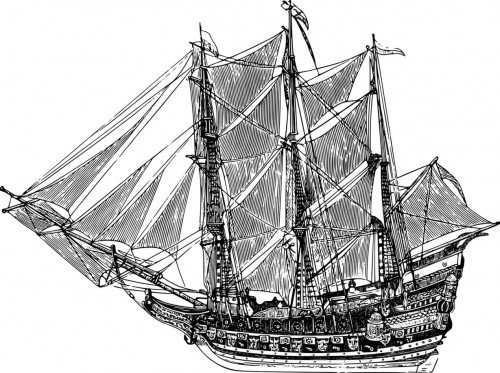
Great article and wouldn't expect anything else from a scientist. Great job and thank you for educating us about this very special being. Namaste :)
Thank you so much! Now I got pretty flattered. I only shared the information I would like to know about this species ;)
Glad we both enjoyed each other's sharing then! :) All for one and one for all! Namaste :)
If you ever need an assistant and feel like flying me to your location let me know. I would love to help you study and understand more about the world we live in and the creatures we share this planet with.
The man of war is an amazing organism(s) indeed. I wish I could of seen it with you as I have never been so close to one.
They are indeed deadly and dangerous.
Stunning pictures, thank you for sharing,
~ @Timbo
Ahh, I'll keep that in mind!!
I only saw man-of-war that time, I never found it again.
Oh wow! Well, at least you have seen it. I have yet to make such a discovery. Wonderful pictures indeed. I hope you find another one a big one!
[Join us on #steemSTEM]
Such a splendid post! Thank you for taking the time to put together this wonderful and interesting presentation on the Man of War!
As a bonus, and in addition to resteeming for exposure, we are awarding you a small 10 Steem Power deposit as a thank you for creating quality STEM related postings on Steemit. We hope you will continue to educate us all!
Uau! Amazing! Thank you so much! As I said I will try to return to my invasive species writing as soon as possible. So many things to share....
AH! Organism cooperation at its finest! Great informative post!
Yeah, that's an amazing feature, hum?! Thank you very much :)
Nice to read and very interesting! :)
Thank you very much!! :)
You are welcome! :) I hope to read more from you about biological topics.
I will, I will! But I also love to share my portuguese food (Sunday cooks) once a week and some challenges too! Hope you don't get much bothered ;)
Of course I won't be bothered (and if I were, who am I to tell people what to write about? Haha). When I visited Portugal once, food was very good, so I am sure your dishes are as well! Maybe I will write a short article with some Portugal-pictures here in steemit one day ...
Thanks, I'm not a professional cooker, but i receive nice compliments ;)
You should, I would like to see Portugal by someone else eyes ;)
We have these in New Zealand, we call them Blue Bottles. I might start calling them man of war now :D
Blue bottles!! AHaH :)
Wish I could visit New Zeland one day as it is Portugal antipod!! ;)
haha yeah doesn't sound quite as cool aye. Def visit if you can!
I'll work to go to Australia and New Zeland...I really must do it! :)
ahah why the name similar to the fruit? upvoted
Didn't reminded this plant! Thanks for that :)
What a coincidence: Physalia physalis the animal and Physalis peruviana the plant!! I discovered the word"physalis" is a greek one and it means bladder"!! It makes sense!
Wow, great post!
Thank you so much!!! :)
This is a fantastic post!! Such a good compilation of pictures and the information about this really interesting cluster of creatures. Well done @liliana.duarte!
Thank you so much!! Just pick the pictures I had (some) and looked for some videos on youtube!
You also wrote a nice informative section on the creature, that is important and really tied everything together nicely.
@liliana.duarte #TIL Portuguese man-of-war, thank you!